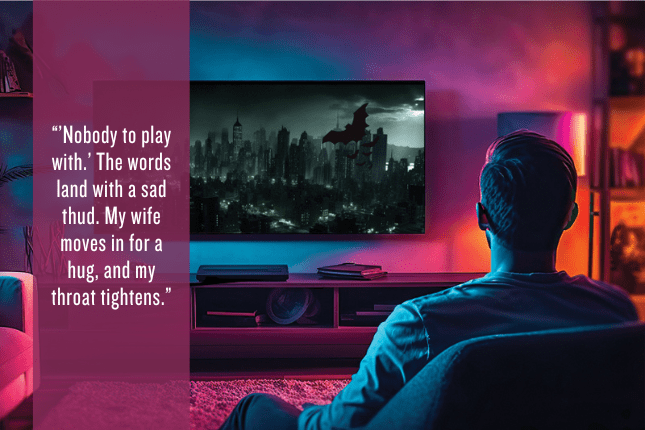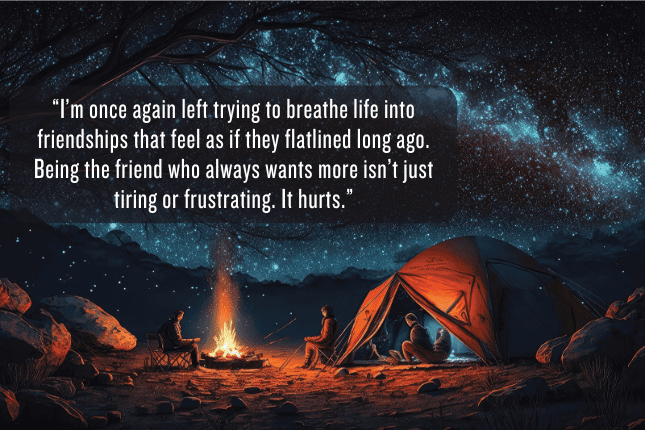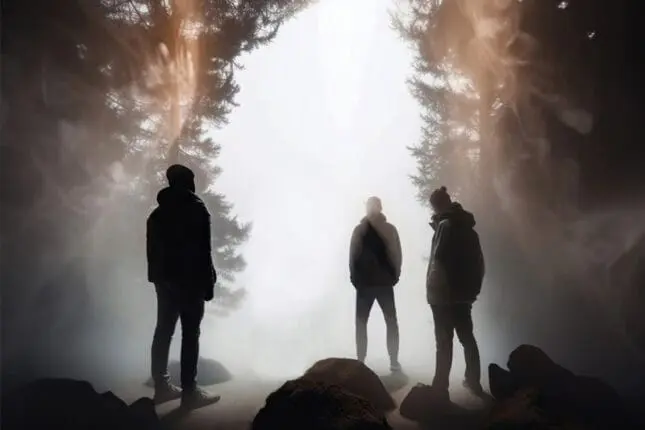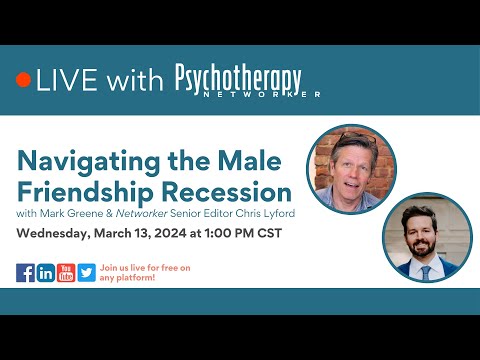Batman looms over the industrial supercomputer, an ink-black cape drawn over his shoulders, like two boulders on opposite ends of a steel girder. He scowls, punching something indistinguishable into the blinking keyboard, and a question appears on my television screen.
Single Player or Multiplayer?
I slump into the couch cushions and press Start on my game controller. Single Player it is. Again.
I’ll say it: Single Player mode sucks. Single implies aloneness. Multi, on the other hand, suggests there’s a buddy next to you on the couch—or at least somewhere in cyberspace. Instead, my old friend and gaming partner Greg has just abandoned me, announcing moments earlier that he wasn’t “into” my latest video game purchase and calling it quits just minutes into playing. Never mind that I’d been looking forward to playing with Greg for days. The night before, I’d spent hours practicing complicated moves, mashing dozens of button combinations until my fingers grew tingly and numb.
“I’ve got some work to do,” Greg’s voice had crackled in my headset before disconnecting. “Another time, okay?” It’s an excuse he’s been using a lot lately, but I didn’t have the energy to call him out. Not tonight.
I spend a few halfhearted rounds crime-fighting alone before my wife pokes her head into the living room. “How’d your game go?” she asks cheerily.
I tell her about Greg’s early departure. “I’ll probably just return this,” I mutter, snapping the game disc back into its plastic case. “What’s the point in keeping it when I’ve got nobody to play with?”
Nobody to play with. The words land with a sad thud. My wife moves in for a hug, and my throat tightens.
How did I get here? I wonder. I’m 36 years old, for god’s sake, not four. And this isn’t the school playground. Grown men don’t say things like “I’ve got nobody to play with.” I feel pathetic.
“It’s okay,” I muster, voice muffling against my wife’s shoulder. “Someday we’ll have kids. I’ll literally make my own friends.” I smile weakly and my wife smiles back, but we both know I’m only half joking.

In case you’re wondering, I’m not some mopey sad sack. Life is pretty darn good. I’m young (sort of) and healthy. I have a wonderful, supportive wife. I have a roof over my head, food on my plate, and a bed so soft it feels like sleeping on a giant marshmallow. There’s a lot to be thankful for. But still, something’s missing: I could really use a Great Male Friend.
I’m not talking about a good friend, where the camaraderie ends at the occasional video game or Chipotle burrito. I want a great friend, one who sees, calls, and texts me more than once every couple of months. I want a friendship that’s accessible and easy, but also full of depth and spontaneity. I want a friend who’s just as comfortable joining me on an impromptu midnight excursion filled with long existential musings as they are howling with laughter over dumb cat videos on YouTube. I want a friend who just gets me.
Why has the Great Male Friend eluded me? I’m not quite sure. I think I bring a lot to the male friend table. I’m a decent storyteller, a good listener, and I ask thoughtful questions. I can spit fun facts like nobody’s business, and I tell a mean dad joke. I’ve got hugs to give and tears to shed, but I’ll also partake in so-called “manly” activities: I’ll drink a beer and cheer at a hockey game. I can hoist a barbell over my head and bring a campfire to a roar. I shower regularly, trim my nails, and chew with my mouth closed.
I may not be everyone’s cup of tea, but hey, I’m not a bridge troll. So why is finding a Great Male Friend so goddamn hard?
The Friendship Recession
It turns out I’m not the only one struggling. According to a 2021 study from the American Enterprise Institute’s Survey Center on American Life, men are in the thick of a “friendship recession.” Between 1990 and 2021, the percentage of men with at least six close friends fell by half. One in five single men polled say they have no close friendships—a fivefold increase since 1990. Only 20 percent of men said they’d received emotional support from a friend over the last week, compared with 40 percent of women.
The problem isn’t as simple as, say, not having a golf partner. It’s literally killing us. There’s a well-established relationship between friendlessness (usually categorized as “loneliness” in research studies) and a host of health problems, both physical and psychological. A 2015 Brigham Young University survey found that loneliness can shorten life expectancy by up to 30 percent. The National Institutes of Health have linked it to dementia and cardiovascular disease. Studies have also found a link between loneliness and suicide in men. According to the Centers for Disease Control and Prevention, men make up nearly 80 percent of suicides, and the suicide rate is nearly four times higher for men than women.
The male friendship recession isn’t just affecting men, though. Women, children, and families—all of society, really—are impacted by it. Stories abound about women who’ve become de facto therapists and “emotional midwives” for their lonely male partners. It’s a dynamic tragicomically portrayed in the 2021 Saturday Night Live skit “Man Park,” where women fed up with their clingy men drop them off at the human equivalent of a dog park so they’re forced to socialize with other men. The video has over five million views to date, and a quick glance at the comments section shows it’s clearly struck a chord.
I feel simultaneously offended, heard, and excited by this possibility, writes one commenter.
This really hits home, writes another.
Jesus’s biggest miracle was he had 12 close male friends by age 30, another jokes.

Is men’s “emotional gold-digging” divorce-worthy? Psychotherapist Robert Garfield, author of Breaking the Male Code, thinks so. He estimates that nearly two-thirds of heterosexual divorces are initiated by women fed up with their husband’s “emotional incompetence,” which includes their inability to form and maintain friendships with other men.
If that wasn’t bad enough, the friendship recession may also be making men angry and violent. A 2023 study in the journal Psychology of Violence, analyzing the psychological crises exhibited by mass shooters over the last 50 years—98 percent of them male—found social isolation to be the most important external indicator leading up to the attacks. Why? According to psychologist and NYU professor Niobe Way, who’s been studying adolescent male friendships for almost four decades, boys “start to disconnect from their own humanity” as they grow older, she recently told ABC News, “because they’re not able to find the relationships they want, and many are depressed and angry about it.”
Of course not all friend-deprived men become violent, but many violent men are friend-deprived. It’s no wonder tens of thousands of men flock to “manosphere” forums, “red pill” propagandists, men’s-rights activists, and misogynistic charlatans like Andrew Tate and Donald Trump. Too often, their followers are hurt men searching for a sympathetic ear and a sense of belonging—in essence, all things a good friendship might provide.
Good male friends aren’t just companions: they’re a bulwark against our worst impulses, against inclinations toward envy, pride, bigotry, hostility, and hate.
The Three Amigos
I’ve got three male friends who’ve played this pivotal role in my own life.
First, there’s Greg. I still remember the day he walked into my office at The Washington Post 11 years ago, sporting a mop of blonde hair, a spaghetti-stained Van Halen concert tee, and a chunky Nikon camera slung around his tall, lanky frame. I was a 20-something reporter looking for a photojournalist to join me on the local news beat, and Greg, equally green and hungry, was looking for a good story. We were a perfect match: Greg a chaotic force who propelled me outside my comfort zone, and me a grounding counterbalance who taught him the value of a high-protein breakfast and eight hours of sleep. Never mind that our stories didn’t make the front page. Cruising down Washington, DC’s streets in Greg’s clunky Ford Explorer, burning cigarettes hanging out the windows, we were a force to be reckoned with—and we were inseparable.
Then there are Pete and Don, old college roommates I’ve known almost 15 years now. Our early years together felt like a classic 1980s coming-of-age movie. We’d stay up late, arm wrestle, cackle over dumb internet memes, scarf down whatever greasy food we could get our hands on, and pull (mostly) innocent pranks on our classmates. In moments where it felt like our 20-something lives were crashing down around us—usually concerning some inconsequential dating mishap—we’d commiserate over long nighttime walks until daylight broke; then we’d rub our tired eyes, fumble goodbyes, and part ways.
At one point, Greg, Pete, and Don were all Great Male Friends. But every passing year has brought new responsibilities, new distractions, and a sort of weariness that’s increasingly pushed our friendships to the wayside. Old jokes that once made us howl with laughter now evoke a sputtering chuckle. Long walks have turned into quick bites at the local greasy spoon diner.
Meanwhile, my friends’ best traits have somehow become their worst qualities. Greg’s adventurousness has morphed into a kind of flakiness: he often neglects to return calls and texts, and bails on plans with little or no notice. Pete’s intelligence and focus can veer on maddening obsession. And after a series of failed romantic relationships, Don’s pragmatism and unbending loyalty have mutated into hypermasculine stoicism, self-isolation, and parroting more than a few conspiracy theories.
Meanwhile, the warmth and vulnerability that punctuated some of our best moments seem long gone. Over my latest bout of diner pancakes with Pete and Don, we spent three hours discussing the merits of a manual car transmission, the pH content of whey protein, and the future of bitcoin. My attempts to steer the conversation in another direction—any direction that felt real and authentic—were largely rebuffed.
Still, there are times when I see glimmers of how these friendships used to be, like last July, when Pete, Don, and I went on an overnight backpacking trip deep into the West Virginia wilderness. That evening, perched on a sliver of rock overlooking a valley of pines, we sat in silence around a crackling campfire as veins of lightning streaked across the purple sky. Pete popped an edible and began to fidget. Don and I laughed, taking turns sipping whiskey from a travel-sized shampoo bottle I’d hastily repurposed the night before. It still tasted like Pantene. We spent hours reminiscing and trading stories, with nothing compelling the night to end except our drooping eyelids. Then, the conversation took an emotional turn.
“You know, I’ve never really relied on anyone,” Don had said flatly. “I’ve always handled problems on my own. Maybe it’s the way I was raised, but I’ve always been like this.”
Pete and I exchanged concerned glances. “You can always count on us,” I’d replied. “We’ll always be here.”
Bring Back the Bromance
At this stage of life, I’ve accepted that sometimes friendships just end. I’ve lost male friends to distance after graduating from college and changing jobs. I’ve lost them in breakups. I’ve lost them to disagreements. But slowly losing loving friendships in the absence of any major life change or conflict? That’s harder to swallow.
I’m baffled by the distance that’s materialized between my three friends and me, by the infrequent meetups and cold conversations that feel better suited for C-SPAN than a dinner between old pals. I sometimes fantasize about grabbing them by the shoulders and giving them a hard shake. “What happened to us?” I’d yell. “Are your brains so full of protein powder and bitcoin that you’ve forgotten what our friendship used to be? What it could be? Why are we settling for less? How the hell did we get here?”
I’m not alone in these feelings. According to a 2021 poll from the Survey Center on American Life, almost half of men report feeling unsatisfied with their friendships. Writer David Carnie might say we’re lamenting the loss of the bromance. Carnie coined the term in the 1990s, a beautiful portmanteau of bro and romance, which Merriam-Webster defines as “a close, nonsexual relationship between two men.”
Some days it’s tempting to believe the bromance isn’t real, or that all friendships lose their luster with age. But gradually falling out of a loving male friendship is anything but normal. In fact, it’s a historical anomaly. In ancient times, strong, affectionate male friendships weren’t just valued, they were revered. Before the 20th century, it wasn’t uncommon for heterosexual American men to drape their arms around one another or hold hands in public. Some even shared a bed to save money—the origin of the word bedfellows.

Why’d things change? It depends on who you ask. Historians, sociologists, and anthropologists point to everything from the Industrial Revolution, which created an atmosphere of competition between men, to the creation of the automobile, which afforded men mobility but also drove them apart. Others blame mid-20th-century ministers and politicians, who decried homosexuality as antithetical to “true manhood,” a sentiment that continued throughout McCarthyism. Others blame technology, violent media, the American education system, parenting styles, and the military. The list goes on and on.
Mark Grayson, founder of the Connecticut-based Naked Man Collective, which is helping men transform and expand traditional notions of masculinity, says the loss of men’s spaces, like sports leagues, men’s clubs, and routine hunting and fishing trips is a main driver of the male friendship recession.
“I remember a time when men routinely gathered,” he says. “It was expected. This was how one generation of men passed on their understanding of what it means to be a man in a community, and the joys and challenges of that.”
Gradually, these spaces have been dismantled—and for good reason: they were problematic and exclusionary. “But in dismantling them,” Grayson explains, “we’ve lost places where men can let their hair down and be open and vulnerable in ways they can’t be elsewhere.”
What men have been left with, says psychologist Amanda Rose, a professor at the University of Missouri who studies adolescent friendships, is known as the shoulder-to-shoulder model of friendship, in which male bonding is arranged around external activities, like sports, instead of meetups with more personal interaction, like chatting over a cup of coffee, which she says is more typical of women.
Mark Greene, a senior editor at The Good Men Project and the author of Remaking Manhood, says the problem is much bigger, hard-baked into American society. Non-loving male friendships, he says, have become the cultural norm. We’ve wrongly feminized loving male friendships, he adds, and in their adolescent and teenage years, boys are pressured to leave them behind.
“We’ve created a hierarchical, dominance-based system in which boys are gradually conditioned out of close friendships and men are pitted against each other,” he says. “First, we isolate them. Then we strip away their connections. We train them out of deeply human capacities for empathy and connection. If a boy shows too much emotion, too much joy, too much need for friendship, we say, ‘What are you, a sissy? Are you a girl? Are you gay?’ This isn’t happening monthly or even weekly for boys, it’s happening hourly.”
I’m not looking for a bedfellow any time soon, but I am hopeful the bromance can make a comeback. I like to think maybe we men are just in the middle of a bad slump, that with a little more work, we can turn a corner. After all, my generation is the one shining a light on the conditioning that’s made us lonely, stoic, and self-interested. My generation helped pioneer the #MeToo and #TimesUp movements. And my generation was raised on media that modeled close friendships. Call me a dreamer, but I think maybe I can have a friendship like Joey and Chandler, or Frodo and Sam, or Han and Chewie.
But I also worry I may be wrong.
Watch Chris’ interview with Mark here.
Hard Decisions
There’s a famous scene in the third Star Wars film where the hero, Luke Skywalker, has deliberately surrendered himself to the enemy in a last-ditch attempt to turn his father, the evil Darth Vader, back from the dark side.
“Search your feelings,” Luke pleads with him. “I know there is good in you. Let go of your hate!”
Some days I feel like Luke, trying desperately to save my male friends from slipping into their own dark sides of cynicism and hyperindividualism. I’m using every Jedi mind trick at my disposal: strategic texts and calls, earnest hugs and I-love-yous, and invites to weekend getaways and movie premieres. I’ve called out Don on his occasional misogyny and gun nuttery. I’ve told Pete he tends to think more with his head than his heart. And I’ve sat Greg down more than a couple times to explain why bailing on plans at the last minute is not okay.
Sometimes it’s brought us closer. But inevitably, my friends revert to their bad habits, and I’m once again left trying to breathe life into friendships that feel as if they flatlined long ago. Being the friend who always wants more isn’t just tiring or frustrating. It hurts.
“Tell me the truth,” I ask my wife after returning home from yet another lackluster pancake dinner with Don and Pete. “Am I the crazy one?”
“You’re not crazy,” she replies. “Maybe you’ve outgrown these friends. Maybe you need new ones.”
Maybe she’s right, I think. I could have better friends if I really put my mind to it. There was that dinner party a few weeks ago where what’s-his-name and I really seemed to hit it off. Sure, we’ve only met twice, but it felt like something was there. Maybe we could make a friendship work. Either way, I deserve better than what I’m getting.
A few days later, when Greg bails yet again, this time on a comedy show I’d bought tickets for months ago, I let him have it.
“You’ve done this too many times,” I text him. “I don’t want a friendship of convenience. It’s not fair to me. We’ve talked about this many times, and I’ve heard ‘I’m sorry’ from you so much that, frankly, it carries no meaning. I count on you breaking plans more often than keeping them. I need to take a long break and reevaluate our friendship.”
Three months later, Greg still hasn’t responded. A part of me hurts. Another part thinks, Good riddance. All of me feels adrift, unsure of what to do next.
“All men,” Mark Greene told me after I shared this sentiment with him, “carry deep-seated memories of friendship with other boys. It feels like one day we look up and it’s suddenly gone. But I want you to know, Chris, that those loving friendships are still there waiting for you. They’re right on the other side of this idea that they’re not possible anymore.”
He’s right, I thought. Maybe in time, Greg, Pete, and Don will come around.
A Different Kind of Pain
But time is never a guarantee. A few weeks after texting Greg, I find myself gripping Pete’s hand while he lies unconscious in a hospital bed. Don sits across from me, holding the other.
A week before Christmas—in the middle of writing this piece—Pete was cycling home from work when he was struck by a speeding car. He was thrown from the bike and landed on his chin, breaking his jaw, fracturing two vertebrae in his neck, and suffering a traumatic brain injury that left him in a coma. The driver fled the scene.
Plastic tubes sprout from Pete’s mouth and forehead. A ventilator puffs quietly in the background, and I hang my head and let out dry, heaving sobs. After a minute or two, Don moves to the other side of the bed and drapes his arm across my back. He doesn’t cry. Instead, he starts naming the different devices plugged into Pete’s body and describing how they’re keeping him alive. I’m simultaneously appalled and envious of his ability to keep his emotions at bay. I nod along until he stops talking. Then, after a few minutes of silence, I ask the only question I can muster.
“So otherwise, how’s everything going for you?”
Don shakes his head. “Not good,” he says flatly.
“Why’s that?” I ask. “Dating? Work? Family?”
He turns to look at me, and for the first time in a long time, his eyes fill with tears.
“All of it.”

I spend the next week in the hospital, praying for good news. I carve out a corner in the cafeteria downstairs with Pete’s friends and family, most of whom I’m meeting for the first time. We dig into care packages filled with comfort food, take naps, and put our feet up on the cushions. We trade stories about Pete, slowly piecing together the constellation of his life, where he’s been and who he’s touched. We take turns laughing, crying, and staring into space. We grieve, we hold each other, and we wait.
On the eighth day, as I’m driving home for the evening, I get a call from Pete’s fiancée. She tells me the doctors say he won’t make it through the night. I begin to sob again, in a way I never knew I could, and turn the car around.
Back at the hospital, I take a seat next to Pete, this time alone. I run my hand across his forearm, over snaking tubes and wires. I stroke the blonde hair on his wrist, all the way down to his swollen hands, then touch his knuckles until I’m at his fingernails. It’s a level of intimacy we’ve never had before now.
An ICU nurse pokes her head in the room. Even though he’s in a coma, she says, Pete can hear me. So I start talking.
“Pete, do you remember the time at my bachelor party when you almost walked me and the other groomsmen off a cliff? Or back in college, when you lit a stink bomb in the girls’ dorm and hid in the bushes? I thought you’d never stop laughing. Or that time we flew kites on the beach in California, and you slipped off that big rock and I had to pull you out of the ocean? Those were good times, man.
“I want you to know how proud I am of you. Remember how you’d complain about your grades but still got a full ride to NYU Law? God, you always knew how to piss people off. I wish you could see your fiancée downstairs, how strong she’s been. You picked a great one. I promise we’ll take care of her. Your mom too. I’m so sorry this happened, man. You didn’t deserve this. You were an amazing friend, and I’ve learned so much from you. Fuck, you’ve been like a brother to me.”
I stand up and give Pete’s leg a final squeeze before walking out. It’s the last time I’ll see him.
“Pancakes soon. Okay, buddy? I love you.”
Finding a Way Forward
On our last day at the hospital, Pete’s friend Alex catches me in the elevator. For years, I’d only heard stories about him through Pete, but we’ve gotten to know each other over these last couple days.
“Let’s stay in touch,” he says. “Pete would have wanted that.”
I nod. In any other situation, I’d relish the opportunity. But it’s hard to think about making new friends, or doing much of anything, when life feels like it’s moving in slow motion, when you catch yourself staring out the window for minutes at a time, thinking about nothing and everything all at once.
There is no meaning to be found in a senseless, preventable death like Pete’s. I didn’t need a test from the universe to teach me the value of male friendship. I’ve known for a long time that good friends are rare and precious. I’d be lying if I said I wasn’t thinking about calling Greg. Life’s too short to stay angry.
In the end, my search for the Great Male Friend didn’t go the way I’d hoped. But to be honest, I think I’m ready to put that venture to rest. It turns out I had Great Male Friends all along. Sure, they have some blemishes, but at their core, they’re good men. They’re men that Mark Greene calls part of a “massive moveable middle.” They’re men who’ve been conditioned out of loving friendships, but deep down, want them back.
“If they see other men leading in a more openhearted way, if they’re given permission to connect, we can shift the culture,” he says. “We’re at a tipping point where change isn’t just in men’s circles, or in therapists’ offices. It’s happening because men are naturally inclined toward being openhearted, and frankly, they’re fed up with people telling them they can’t be.”
I think back to my wedding day. Getting ready in the groom’s suite, Pete and Don struck up a conversation about home repairs. I resisted the urge to clunk their heads together. But when I realized I’d foolishly forgotten my white button-up back at home, just two hours before the ceremony, Pete began stripping off his own. “This is happening,” he said, pushing the shirt into my hands. “This is what friends do.”
I hugged him tight. “What would I do without you?”
I’m intentional about my friendships. I tell friends what I think and feel. That doesn’t bring Pete back, but it does bring me some comfort knowing I loved him fully, without much room for regret. I hope that when the time is right, that same vulnerability will help me take the leap of faith to look for new friends, and love them fully too.
In the meantime, I know I need to be kinder to myself. When a friend bails on a video game, for instance, it’s not a reflection of who I am, as a man or a friend. I’m not pathetic, even when I have “nobody to play with.” The system is broken. And like so many men, I’m still finding my way through it.
Main Illustration by CLEVERSTOCK
Second Illustration by LEARCHITECTO/HASAN
Third Illustration by EVENINGTAO
Chris Lyford
Chris Lyford is the Senior Editor at Psychotherapy Networker. Previously, he was assistant director and editor of the The Atlantic Post, where he wrote and edited news pieces on the Middle East and Africa. He also formerly worked at The Washington Post, where he wrote local feature pieces for the Metro, Sports, and Style sections. Contact: clyford@psychnetworker.org.













